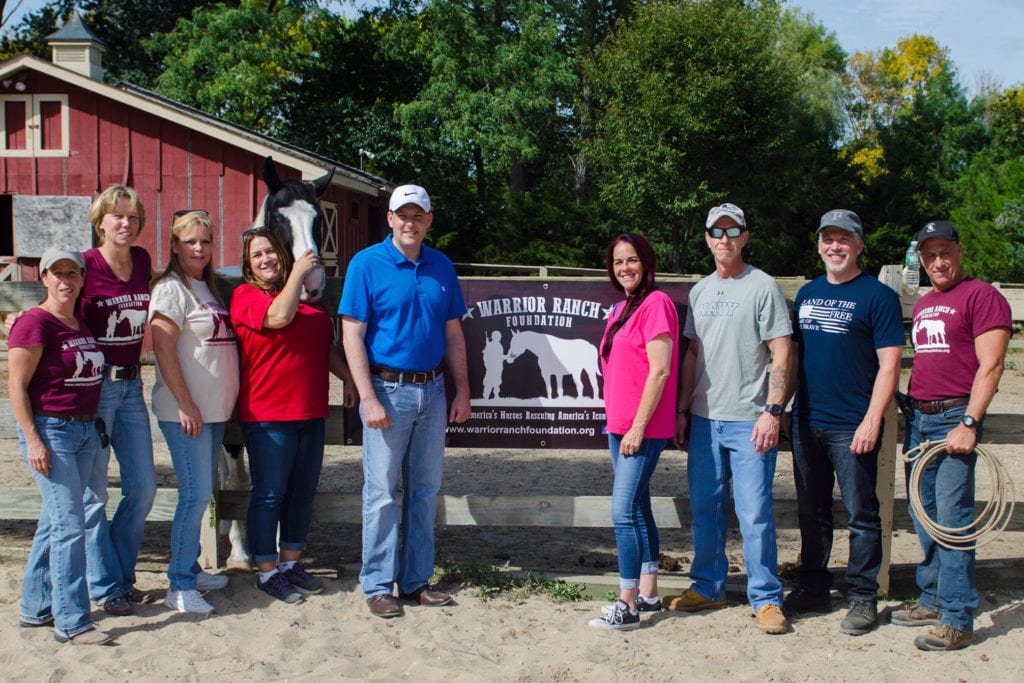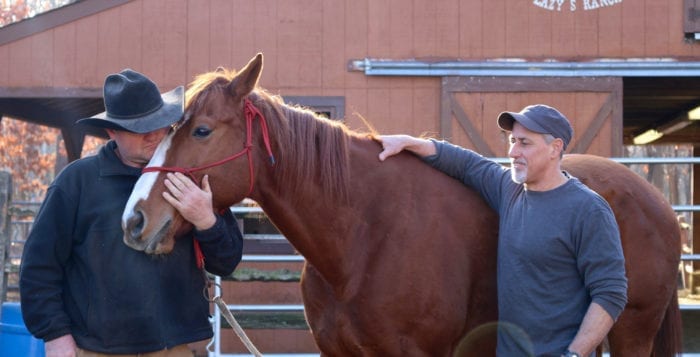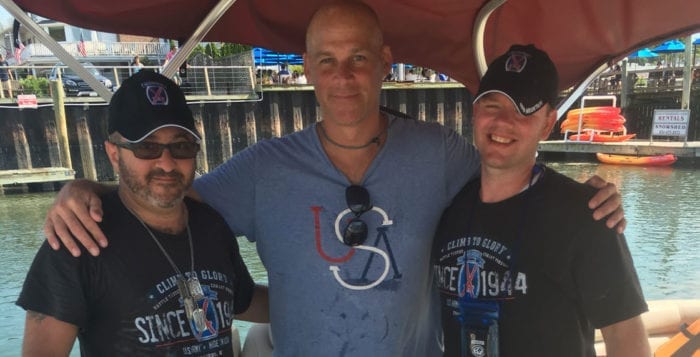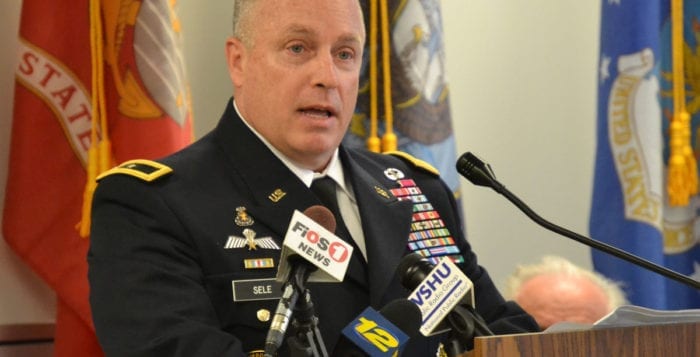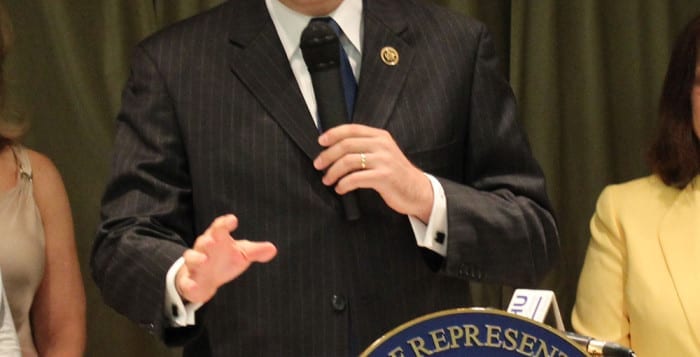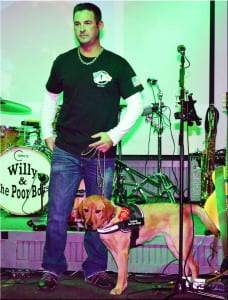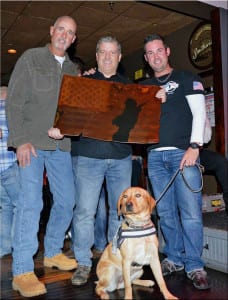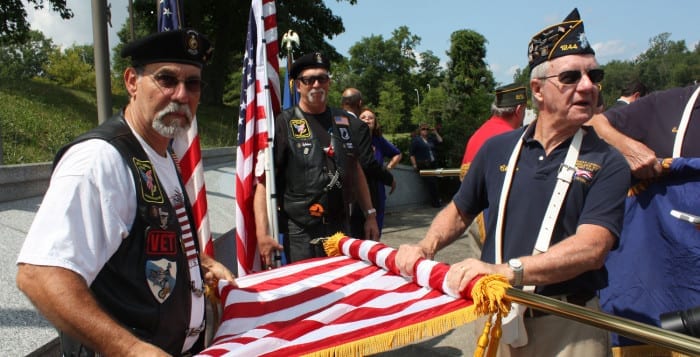When Marine Corps veteran StaceyAnn Castro first stepped into the round pen with a horse at Warrior Ranch Foundation, her guard was up.
Castro, who served in Operation Enduring Freedom from 2002 to 2004, and admittedly struggles with post-traumatic stress disorder, was face to face with a 1,400-pound Friesian horse named BlackJack during a July demonstration by the Mount Sinai and Islip-based nonprofit, which pairs military and first-responder veterans with rescue horses in need of rehabilitation and training.
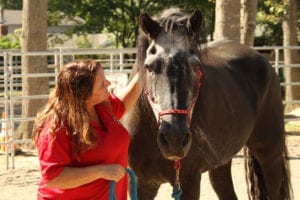
The tough-as-nails veteran was attempting to engage BlackJack in basic ground exercises, but the horse was not budging. Its guard was up too.
“I soon realized it was because I was terrified of him,” Castro later said. “When you’re with these horses they feel everything you’re feeling, even the emotions you think you’re hiding from everybody else. You can’t hide them from a horse.”
Castro relaxed, and as she calmed down, so did BlackJack. The horse began to lick and chew — a reflex associated with the animal’s release of stress.
“By the end of the session, I wound up with a friend,” she said of BlackJack. “With the horses, you have someone you’re actually bonding with in your own private, silent language. It’s beautiful.”
Officially incorporated in June 2016, the Warrior Ranch Foundation has helped reduce the stress levels and PTSD symptoms of more than a dozen veterans still recuperating from a wide range of conflicts — from the Korean War to Vietnam War to the war in Afghanistan — by teaching them how to groom, feed and train troubled horses. And much like the veterans, the nine residential horses, mostly retired race and show animals that have been trained their whole lives to compete and perform in high-stakes settings, are learning to adapt to a new, more relaxed world.
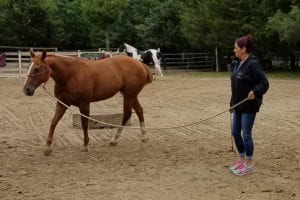
“There’s a strong parallel between them and it’s amazing to see their emotional breakthroughs,” said Eileen Shanahan, the nonprofit’s founder and president. “While the race horses are trained to run, run, run, and as a result have emotional issues, the veterans are trained to go out there and do the best they can to protect and defend us. When they come back, they have to shut that off and that’s not so easy. We provide a safe haven for these humans and animals.”
Shanahan’s organization is the result of her lifelong love of country and horses. The Queens native, who shoots and produces television programs and commercials for a living, comes from a large military family with a father who served in the Marines, an uncle and brother in the Navy, nephews in the Army, as well as several first responders.
Although she mostly rode buses and subways growing up, Shanahan always admired horses from afar, seeing them as beautiful creatures.
When she got married and moved to East Quogue in the 1980s, she took up horseback riding and, 15 years ago, began adopting rescue horses and studying natural horsemanship — a variety of rapport-based horse training techniques.

For nearly a decade, she dreamt of providing this outlet for local veterans and finally launched it with the help of longtime friends and equestrians specialists. While the group currently works out of two private barns, the future plan is to turn Warrior Ranch into a national organization.
“We want to eventually help hundreds of veterans and horses because it really works,” Shanahan said, explaining that interactions like Castro’s is very common at the ranch. “A lot of times when they come here, the veterans have their arms crossed, but by the end of the day, they have ear-to-ear grins. A lot of them break down and cry and it’s so powerful to watch.”
Tony Simonetti, Warrior Ranch’s vice president and top horse trainer, has made a career of rehabilitating emotionally distraught horses and re-interacting them with their human counterparts, resolving more than 500 extremely difficult horse cases for people across the country. When asked his most memorable veteran-horse interaction within the organization, he talked about Army Staff Sergeant Allen Pennington, Warrior Ranch’s first soldier to go through the program, and Red, a 4-year-old, retired race thoroughbred.
“[Allen’s] this big, rough and tough guy, and when the horse connected with him, I just saw all the stress he was holding inside bubble right up through his chest and then he just couldn’t keep himself composed,” Simonetti said. “He broke down and turned around and hugged that horse like it was his battle buddy. And I told him, ‘don’t feel bad about that. That’s what you’re here for.’”
During a testimonial on the Warrior Ranch website, Navy veteran Cathie Doherty, who was diagnosed with PTSD and put on medication for a number of years, said she was grateful to have attended a women veteran’s retreat at the nonprofit.

“It was really an amazing experience,” Doherty said. “I think it touched me much deeper than I imagined it would. I appreciated working with the horses and that I had to make a connection with them. I feel I was present in the moment. I didn’t care about my phone, I didn’t care what was going on around me. It was a beautiful experience for me.”
Castro said companionship with a horse might be more beneficial than a human’s.
“When you’re a veteran and you’re having a bad day, you don’t want to tell anybody, you don’t want to talk about it — you want to forget about it,” she said. “But I also don’t want to be alone and, so, when you’re there with the horse, and that horse knows what you’re going through and feeling, he feels it too. And because you love the horse and you don’t want the horse to feel that way, you’re going to try and make yourself feel better. It’s awe-inspiring.”
U.S. Rep. Lee Zeldin (R-Shirley), who served four years in the Army, visited the ranch in Mount Sinai with his family Oct. 7 and saw firsthand the value of the nonprofit.
“It doesn’t take more than a few minutes to see the positive effects that you’re having on these horses, and from these horses the veterans are getting love that they possibly have never experienced
before,” Zeldin said. “In a way, you’re directly coping with the symptoms of PTSD while also productively escaping the worst of it. It’s a great concept and I’d love to see Warrior Ranch grow into something a whole lot bigger than it already is.”
